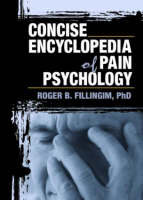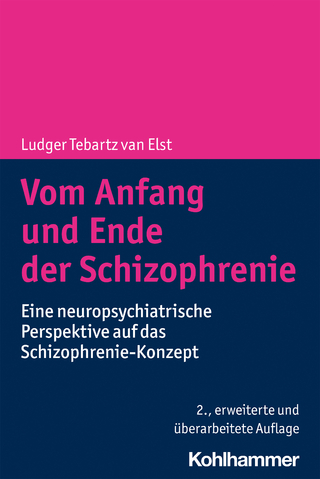
Concise Encyclopedia of Pain Psychology
Informa Healthcare (Verlag)
978-0-7890-1894-6 (ISBN)
- Titel ist leider vergriffen;
keine Neuauflage - Artikel merken
The Concise Encyclopedia of Pain Psychology provides you with up-to-date information on a broad range of topics on pain psychologyall in one volume. Dr. Roger B. Fillingim, one of the foremost international authorities on pain psychology, has authored an invaluable encyclopedia that makes reference fast, easy, and accurate. This single source provides the basic information you need to findin a compact, useful form that is less expensive and more convenient to use than full-length textbooks and references.
The field of pain psychology has a long history, and its scientific and clinical contributions in pain management have grown exponentially over the past several decades. The Concise Encyclopedia of Pain Psychology compresses this information down to an easy-to-use form, bringing to your desk a valuable, informative source for terms, definitions, classic papers, and important findings in the field of pain psychology. This resource, with its comprehensive bibliography of source material, is a must-have for your library.
The Concise Encyclopedia of Pain Psychology presents:
A-to-Z listings of pain psychology topics
up-to-date information
terms, descriptions, definitions, and important findings, all well-researched and accurate
an extensive bibliography for each entry to allow further detailed study of topics
The Concise Encyclopedia of Pain Psychology is a broad range concise reference source perfect for psychologists, physicians, professional health care providers, medical students, graduate students, or anyone researching pain and pain psychology.
Introduction
Abuse
Acceptance
Acute pain
Addiction
Aging
Alexithymia
Allodynia
Alternative medicine
Analgesia
Anger
Anterior cingulate
Antidepressants
Anxiety
Anxiety sensitivity
Beck Depression Inventory
Behavioral factors
Beliefs
Biofeedback
Biopsychosocial model
Cancer pain
Catastrophizing
Chest pain
Child abuse
Children
Chronic pain
Cognitive-behavioral therapy
Complex regional pain syndrome
Consciousness
Conversion disorder
Coping
Cortisol
Culture
Depression
Diathesis-stress model
Disability
Distraction
Drug abuse
Dysmenorrhea
Education
Emotion
Endogenous opioids
Ethnicity
Exaggeration
Exercise
Expectancies
Experimental pain
Eye movement desensitization and reprocessing
Factitious disorder
Family
Fatigue
Fear avoidance
Fibromyalgia
Functional assessment
Gate control theory
Gender
Genetics
Group therapy
Headache
Hyperalgesia
Hypertension
Hypervigilance
Hypnosis
Hypochondriasis
Hysteria
Irritable bowel syndrome
Language
Learning
Legal issues
Malingering
McGill Pain Questionnaire
Memory for pain
Menstrual cycle
Mindfulness-based stress reduction
Minnesota Multiphasic Personality Inventory
Motivation
Multidimensional Pain Inventory
Neuromatrix
Neuropathic pain
Neuropsychological testing
Neuroticism
Nocebo
Nociception
Nonorganic signs
Obstetric pain
Operant conditioning
Opioid therapy
Oswestry Low Back Pain Disability Questionnaire
Pain
Pain assessment
Pain threshold and tolerance
Palliative care
Patient-centered treatment
Pelvic pain
Personality
Phantom limb pain
Placebo
Postoperative pain
Post-traumatic stress disorder
Prayer
Psychodynamic theory
Psychogenic pain
Psychophysics
Quality of life
Reflex sympathetic dystrophy
Relaxation training
Reliability
Religion/spirituality
Secondary gain
Self-efficacy
Serotonin
Sexual abuse
Sleep disorders
Social learning
Social support
Somatization
Spousal responses
Stages of change
Stress
Suffering
Suicide
Temporal summation
Temporomandibular disorders
Treatment outcome
Validity
Visual analog scales
Waddell signs
Workers’ compensation
References
Index
| Erscheint lt. Verlag | 19.9.2005 |
|---|---|
| Verlagsort | New York |
| Sprache | englisch |
| Gewicht | 340 g |
| Themenwelt | Geisteswissenschaften ► Psychologie ► Biopsychologie / Neurowissenschaften |
| Medizin / Pharmazie ► Medizinische Fachgebiete ► Schmerztherapie | |
| ISBN-10 | 0-7890-1894-2 / 0789018942 |
| ISBN-13 | 978-0-7890-1894-6 / 9780789018946 |
| Zustand | Neuware |
| Informationen gemäß Produktsicherheitsverordnung (GPSR) | |
| Haben Sie eine Frage zum Produkt? |
aus dem Bereich


